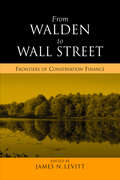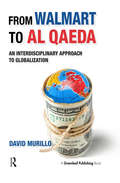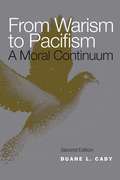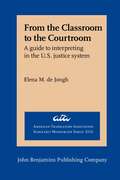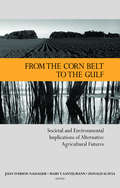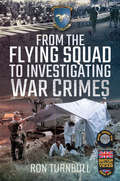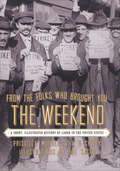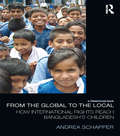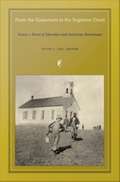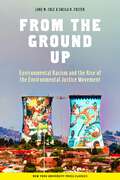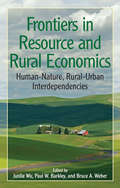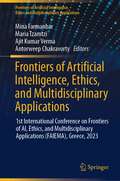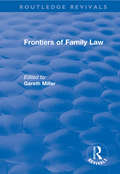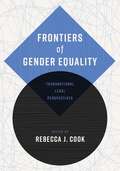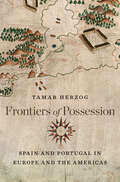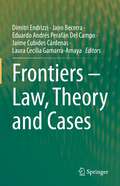- Table View
- List View
From Walden to Wall Street: Frontiers of Conservation Finance
by James N. Levitt"From Walden to Wall Street makes clear that a system of market-based conservation finance is vital to the future of environmental conservation." -Henry M. Paulson, Chairman and CEO, Goldman Sachs Group, Inc.; Chairman of the Board of Governors, The Nature Conservancy In the absence of innovation in the field of conservation finance, a daunting funding gap faces conservationists aiming to protect America's system of landscapes that provide sustainable resources, water, wildlife habitat, and recreational amenities. Experts estimate that the average annual funding gap will be between $1.9 billion and $7.7 billion over the next forty years. Can the conservation community come up with new methods for financing that will fill this enormous gap? Which human and financial resources will allow us to fund critical land conservation needs? From Walden to Wall Street brings together the experience of more than a dozen pioneering conservation finance practitioners to address these crucial issues. Contributors present groundbreaking ideas including mainstreaming environmental markets; government ballot measures for land conservations; convertible tax-exempt financing; and private equity markets. The creativity and insight of From Walden to Wall Street offers considerable hope that, even in this era of widespread financial constraints, the American conservation community's financial resources may potentially grow dramatically in both quantity and quality in the decades to come.
From Walmart to Al Qaeda: An Interdisciplinary Approach to Globalization
by David MurilloFrom Walmart to Al Qaeda explains the fuzzy, complex and seemingly incomprehensible concept of globalization. What is globalization? What are the core topics, theories and competing ideologies? Are we walking towards homogenization or towards a global collision of cultures and identities? The potential risks and challenges for the global economy, corporations and political regimes are acknowledged by most but not fully understood. This book provides a refreshing new look at how society is being shaped by globalization and how these apparent destructive patterns can be both explained and potentially remedied.Globalization is both a concept and a cliché. It is a term that is used to explain an economic system or the state of the world. David Murillo sets out the questions and identifies the interrelationships of different disciplines to both understand the issues and also find solutions. The book discusses globalization and current attempts to conceptualize and measure it. There are theoretical and ideological debates on whether globalization is inevitable and the various alternatives for interpreting how the world works.Accompanying Teaching Notes are available on request with the purchase of this book.
From Warism to Pacifism: A Moral Continuum
by Cady Duane L.Duane Cady views warism and pacifism as polar extremes on a continuum that embraces a full spectrum of ethical positions on the morality of war and peace. Realizing that he could not intellectually defend the notions of just-war theory, he found that he was a reluctant pacifist. In this new edition of From Warism to Pacifism, Cady continues to expose the pervasive, subconscious warism that is the dominant ideology in modern Western culture. He explores the changes over the last twenty years—from the end of the Cold War to the ongoing “war on terror,” as well as Barack Obama winning the Nobel Prize for Peace. Like racism and sexism, the uncritical presumption that war is morally justifiable, even morally required, misguides our attitudes and institutions. In its place, Cady proposes the development of a positive concept of peace. Citing common objections to pacifist values, he describes peace as something more than the mere absence of war and demonstrates that pacifism is a defensible position.
From the American Civil War to the War on Terror
by Emily HartzThis book offers a systematic and comprehensive account of the key cases that have come to shape the jurisprudence on emergency law in the United States from the Civil War to the War on Terror. The legal questions raised in these cases concern fundamental constitutional issues such as the status of fundamental rights, the role of the court in times of war, and the question of how to interpret constitutional limitations to executive power. At stake in these difficult legal questions is the issue of how to conceive of the very status of law in liberal democratic states. The questions with which the Supreme Court justices have to grapple in these cases are therefore as philosophical as they are legal. In this book the Court's arguments are systematized according to categories informed by constitutional law as well as classic philosophical discussions of the problem of emergency. On this basis, the book singles out three legal paradigms for interpreting the problem of emergency: the rights model, the extra-legal model and the procedural model. This systematic approach helps the reader develop a philosophical and legal overview of central issues in the jurisprudence on emergency.
From the Classroom to the Courtroom: A Guide to Interpreting in the U. S. Justice System (American Translators Association Scholarly Monograph #XVII)
by Elena M. de JonghThis book offers a wealth of information that will assist aspiring court interpreters in providing linguistic minorities with access to fair and expeditious judicial proceedings. <p><p> The guide will familiarize prospective court interpreters and students interested in court interpreting with the nature, purpose and language of pretrial, trial and post-trial proceedings. Documents, dialogues and monologues illustrate judicial procedures; the description of court hearings with transcripts creates a realistic model of the stages involved in live court proceedings. <p><p> The innovative organization of this guide mirrors the progression of criminal cases through the courts and provides readers with an accessible, easy-to-follow format. It explains and illustrates court procedure as well as provides interpreting exercises based on authentic materials from each successive stage. This novel organization of materials around the stages of the judicial process also facilitates quick reference without the need to review the entire volume ― an additional advantage that makes this guide the ideal interpreters’ reference manual. <p><p> Supplementary instructional aids include recordings in English and Spanish and a glossary of selected legal terms in context.
From the Closet to the Courtroom: Five LGBT Rights Lawsuits That Have Changed Our Nation (Queer Ideas/Queer Action #4)
by Michael Bronski Carlos A. BallThe advancement of LGBT rights has occurred through struggles large and small-on the streets, around kitchen tables, and on the Web. Lawsuits have also played a vital role in propelling the movement forward, and behind every case is a human story: a landlord in New York seeks to evict a gay man from his home after his partner of ten years dies of AIDS; school officials in Wisconsin look the other way as a gay teenager is repeatedly and viciously harassed by other students; a lesbian couple appears unexpectedly at a clerk's office in Hawaii seeking a marriage license.<P> Engaging and largely untold, From the Closet to the Courtroom explores how five pivotal lawsuits have altered LGBT history. Beginning each case narrative at the center-with the litigants and their lawyers-law professor Carlos Ball follows the stories behind each crucial lawsuit. He traces the parties from their communities to the courtroom, while deftly weaving in rich sociohistorical context and analyzing the lasting legal and political impact of each judicial outcome.<P> Over the last twenty years, no group of attorneys has helped to transform this country more than LGBT rights lawyers, and surprisingly, their collective accomplishments have received relatively little attention. Ball remedies that by exploring how a band of largely unheralded civil rights lawyers have attained remarkable legal victories through skill, creativity, and perseverance.In this richly layered and multifaceted account, Ball vividly documents how these judicial victories have significantly altered LGBT lives today in ways that were unimaginable only a generation ago.
From the Corn Belt to the Gulf: Societal and Environmental Implications of Alternative Agricultural Futures
by Joan Iverson Nassauer Mary V. Santelmann Donald ScaviaNutrients from farms in the Mississippi River Basin are the leading cause of the Gulf of Mexico‘s 'Dead Zone,' a 5,000 to 7,000 square mile region where declining oxygen levels are threatening the survival of marine life. From the Corn Belt to the Gulf explores how new agricultural policy can help alleviate this problem, and at the same time improve water quality overall, enhance biodiversity, improve the quality of life for the people who live and work in Corn Belt communities, and relieve downstream flooding. The themes of the book are the far-reaching environmental impacts of Corn Belt agriculture, including associated economic and social effects at multiple spatial scales - and the potential for future agricultural policy to address those impacts through changes in agricultural landscapes and practices. We know that the environmental 'footprint' of Corn Belt agriculture extends beyond farmland and adjacent lakes and streams to groundwater, rivers, cities downstream, into the Gulf of Mexico, and, ultimately, to global oceanic and atmospheric systems. And we acknowledge that agricultural policies, including commodity support payments, have economic impacts at the national and international levels. Pressing negotiations with America‘s trade partners, along with increasing societal attention to both the costs and environmental effects of current agricultural policy, are creating momentum for policy change. From the Corn Belt to the Gulf presents innovative, integrated assessments of the agriculture and ecological systems in the Mississippi River Basin along with studies of local Iowa agricultural watersheds. Contributors from multiple academic and professional disciplines discuss how agricultural policies have contributed to current environmental conditions, and, in what the authors term 'alternative futures' for agricultural landscapes, envision how new policy can help achieve more beneficial patterns.
From the Flying Squad to Investigating War Crimes
by Ron Turnbull“Looks at more recent genocide through the eyes of a British detective who spent time investigating Bosnian war crimes . . . fascinating insight.” —FiretrenchFor over ten years he was first detective on the scene when a murder was committed in south London. In the confusion and horror of the crime scene he identified the forensic clues that would later be needed to convict the killer in the calm and measured atmosphere of the Old Bailey; calling out the necessary experts from pathologists to ballistics specialists; protecting the scene against contamination. One slip and a case would crumble; one moment of inspiration and the Yard would have its man. He was the natural choice when the UN were looking for an experienced detective to create a trail of evidence linking the mass graves of Bosnia to the people who ordered the worst war crimes seen in Europe since the Second World War. From the Flying Squad to Investigating War Crimes tells of the rise of forensic evidence against the true story backdrop of a detective who has spent a career at the front line in the war against murder—the ultimate crime. It traces the development of forensic science and techniques from the days of the fingerprint to the battery of tests now available to homicide investigators. It is told in the no nonsense style of a pioneer cop who has seen the worst that human beings can do to each other.“The extraordinary autobiography of an extraordinary man who gathered evidence against the most heinous criminals.” —Books Monthly
From the Folks Who Brought You the Weekend: An Illustrated History of Labor in the United States
by Priscilla Murolo A.B. ChittyNewly updated: &“An enjoyable introduction to American working-class history.&” —The American Prospect Praised for its &“impressive even-handedness&”, From the Folks Who Brought You the Weekend has set the standard for viewing American history through the prism of working people (Publishers Weekly, starred review). From indentured servants and slaves in seventeenth-century Chesapeake to high-tech workers in contemporary Silicon Valley, the book &“[puts] a human face on the people, places, events, and social conditions that have shaped the evolution of organized labor&”, enlivened by illustrations from the celebrated comics journalist Joe Sacco (Library Journal). Now, the authors have added a wealth of fresh analysis of labor&’s role in American life, with new material on sex workers, disability issues, labor&’s relation to the global justice movement and the immigrants&’ rights movement, the 2005 split in the AFL-CIO and the movement civil wars that followed, and the crucial emergence of worker centers and their relationships to unions. With two entirely new chapters—one on global developments such as offshoring and a second on the 2016 election and unions&’ relationships to Trump—this is an &“extraordinarily fine addition to U.S. history [that] could become an evergreen . . . comparable to Howard Zinn&’s award-winning A People&’s History of the United States&” (Publishers Weekly). &“A marvelously informed, carefully crafted, far-ranging history of working people.&” —Noam Chomsky
From the Global to the Local: How International Rights Reach Bangladesh's Children (Law, Development and Globalization)
by Andrea SchapperFrom the Global to the Local develops a unique perspective on human rights governance in developing countries, where the state often lacks the required resources, capacities and expertise for implementing rights. Considering how rights that have been agreed upon in the global arena of world politics are locally implemented, this book then specifically explores how they reach the local children of Bangladesh’s urban slums and poor rural areas. Andrea Schapper combines an analytical framework grounded in international relations scholarship on global governance with empirical field research methods that have their basis in sociology and anthropology. Utilising this methodology, the book examines three principles that represent a global consensus on children’s rights (the protection of children from the worst forms of child labor, providing them with primary education, and delivering basic health care services to them) to illuminating the need for local and contextual solutions to transnational issues. Exploring such concerns with vigor, this book fills a gap in the study of human rights implementation and protection and will thus be of immense interest to students of Law, of International Relations and of Development Studies.
From the Grassroots to the Supreme Court: Brown v. Board of Education and American Democracy
by Peter F. LauPeter F. Lau is an independent scholar who earned his doctorate in history from Rutgers University. He has taught at Rutgers and the University of Rhode Island. Currently he is teaching history at Lincoln School in Providence, Rhode Island.
From the Great Wall to Wall Street: A Cross-Cultural Look at Leadership and Management in China and the US
by Wei YenWei Yen explores how differences in world views between Eastern and Western thought and culture have on management and leadership behaviors.In The Geography of Thought Richard Nisbett showed how the thought and culture of the East is rooted in Chinese Confucian ideals while that of the West goes back to the early Greeks. In From Great Wall to Wall Street, Wei Yen explores how these differences impact today’s leadership and management practices. He delves deeply into the two cultures and their philosophical roots, and explains why there can exist significant misunderstandings between the two camps.Yen was born in China, raised in Hong Kong, educated both there and in the US and then spent half his working life in the US and half in Asia. From his vantage point, straddling both cultures he compares and contrasts the pragmatic, wholistic Chinese (or Asian) management style with the rational and analytical Western management style. He shows their pros and cons, the areas where they differ and situations where one may be more successful than the other.Yen argues that understanding traditional Chinese culture, and how it affects management behaviors and current events, can help decision makers make better decisions in business, finance and politics. He further combines culture with credit analysis to argue that it is unlikely that China will suffer a financial collapse despite a slowing economy and high debt levels. Equally, he shows how that same philosophical traditions also lie behind China’s inability to innovate or project the “soft power” that the West’s globally successful popular culture has achieved.How can the West take advantage of China’s epic rise to strike win-win outcomes? How can the Chinese be more integrated into the global community and become a better global citizen in the future? How can policy makers make more realistic policies? None of these can be accomplished without first understanding where each other is coming from.
From the Ground Up: Environmental Racism and the Rise of the Environmental Justice Movement (Critical America #34)
by Luke W. Cole Sheila R. FosterA critical look at the movement for environmental justiceWhen Bill Clinton signed an Executive Order on Environmental Justice in 1994, the phenomenon of environmental racism—the disproportionate impact of environmental hazards, particularly toxic waste dumps and polluting factories, on people of color and low-income communities—gained unprecedented recognition. Behind that momentous signature, however, lies a remarkable tale of grassroots activism and political mobilization. Today, thousands of activists in hundreds of locales are fighting for their children, their communities, their quality of life, and their health.From the Ground Up critically examines one of the fastest growing social movements in the United States—the movement for environmental justice. Tracing the movement's roots, Luke Cole and Sheila Foster combine long-time activism with powerful storytelling to provide gripping case studies of communities across the US—towns like Kettleman City, California; Chester, Pennsylvania; and Dilkon, Arizona—and their struggles against corporate polluters. The authors use social, economic and legal analysis to reveal the historical and contemporary causes for environmental racism. Environmental justice struggles, they demonstrate, transform individuals, communities, institutions and the nation as a whole.
From the War on Poverty to the War on Crime: The Making of Mass Incarceration in America
by Elizabeth HintonHow did the land of the free become the home of the world's largest prison system? Elizabeth Hinton traces the rise of mass incarceration to an ironic source: not the War on Drugs of the Reagan administration but the War on Crime that began during Johnson's Great Society at the height of the civil rights era.
Front Row at the Trump Show
by Jonathan KarlAn account like no other from the White House reporter who has known President Trump for more than 25 years. We have never seen a president like this...norm-breaking, rule-busting, dangerously reckless to some and an overdue force for change to others. One thing is clear: We are witnessing the reshaping of the presidency. <P><P>Jonathan Karl brings us into the White House in a powerful book unlike any other on the Trump administration. He&’s known and covered Donald Trump longer than any other White House reporter. With extraordinary access to Trump during the campaign and at 1600 Pennsylvania Avenue, Karl delivers essential new reporting and surprising insights. <P><P>These are the behind-the-scenes moments that define Trump&’s presidency--an extraordinary look at the president, the person, and those closest to him. This is the real story of Trump’s unlikely rise; of the struggles and battles of those who work in the administration and those who report on it; of the plots and schemes of a senior staff enduring stunning and unprecedented unpredictability. <P><P>Karl takes us from a TV set turned campaign office to the strange quiet of Trump’s White House on Inauguration Day to a high-powered reelection campaign set to change the country’s course. He shows us an administration rewriting the role of the president on the fly and a press corps that has never been more vital. Above all, this book is only possible because of the surprisingly open relationship Donald Trump has had with Jonathan Karl, a reporter he has praised, fought, and branded an enemy of the people. This is Front Row at the Trump Show. <P><P><b> A New York Times Bestseller</b>
Front Toward Enemy: A Slain Soldier's Widow Details Her Husband's Murder and How Military Courts Allowed the Killer to Escape Justice
by Barbara AllenA slain soldier&’s widow details her husband&’s murder by a fellow soldier . . . and exposes how the US military courts allowed the killer to escape justice. June 7, 2005. A sandstorm obscured what light lingered in Iraq&’s nighttime sky as Staff Sergeant Alberto Martinez tied a claymore mine to a window grate. On the other side of the window was Lieutenant Louis Allen, a husband and father of four young boys, and his good friend and Commanding Officer Captain Phillip Esposito, a West Point graduate and father of a baby girl. The men were engaged in a board game, unwinding after a hard day, when without warning the window exploded. More than seven hundred steel ball bearings erupted from the mine and hurtled inward with lethal force, obliterating everything in their kill zone. Martinez was arrested and tried for the murders. But the military judicial system failed, and the killer was set free. How can American soldiers be at risk on their own base, among their fellow soldiers? Could these murders have been prevented? Will it happen again? How can the military&’s judicial system have failed so drastically? What was the government hiding from the slain soldiers&’ families? This book is a personal and factual behind-the-scenes account of a case that is to the military judicial system what the O. J. Simpson case is to the civilian judicial system.
Frontier Democracy
by Silvana R. SiddaliFrontier Democracy examines the debates over state constitutions in the antebellum Northwest (Indiana, Illinois, Iowa, Michigan, Minnesota, Ohio, and Wisconsin) from the 1820s through the 1850s. This is a book about conversations: in particular, the fights and negotiations over the core ideals in the constitutions that brought these frontier communities to life. Silvana R. Siddali argues that the Northwestern debates over representation and citizenship reveal two profound commitments: the first to fair deliberation, and the second to ethical principles based on republicanism, Christianity, and science. Some of these ideas succeeded brilliantly: within forty years, the region became an economic and demographic success story. However, some failed tragically: racial hatred prevailed everywhere in the region, in spite of reformers' passionate arguments for justice, and resulted in disfranchisement and even exclusion for non-white Northwesterners that lasted for generations.
Frontiers in Resource and Rural Economics: "Human-Nature, Rural-Urban Interdependencies"
by Wu JunJie Paul W Barkley Bruce A WeberMost land in the United States is in rural areas, as are the sources of most of its fresh water and almost all its other natural resources. One of the first books to approach resource economics and rural studies as fundamentally interconnected areas of study, Frontiers in Resource and Rural Economics integrates the work of 18 leading scholars in resource economics, rural economics, rural sociology and political science in order to focus on two complex interdependencies-one pertaining to natural resources and human welfare, the other to urban and rural communities and their economies. The book reviews the past 50 years of scholarship in both natural resource and rural economics. It contrasts their different intellectual and practical approaches and considers how they might be refocused in light of pressing demands on human and natural systems. It then proposes a 'new rural economics' that acknowledges the full range of human-ecosystem and urban-rural interdependencies. It explores the relationship between natural resources and economic growth, and considers the prospects for amenity-driven growth that would benefit both new and traditional inhabitants of rural areas. Later chapters explore the politics of place, spatial economics, strategies for reducing rural poverty, and prospects for linking rural and environmental governance. Throughout, the book emphasizes innovative research methods that integrate natural resource, environmental, and rural economics.
Frontiers of Artificial Intelligence, Ethics, and Multidisciplinary Applications: 1st International Conference on Frontiers of AI, Ethics, and Multidisciplinary Applications (FAIEMA), Greece, 2023 (Frontiers of Artificial Intelligence, Ethics and Multidisciplinary Applications)
by Ajit Kumar Verma Antorweep Chakravorty Mina Farmanbar Maria TzamtziThis groundbreaking proceedings volume explores the integration of Artificial Intelligence (AI) across key domains—healthcare, finance, education, robotics, industrial and other engineering applications —unveiling its transformative potential and practical implications. With a multidisciplinary lens, it transcends technical aspects, fostering a comprehensive understanding while bridging theory and practice. Approaching the subject matter with depth, the book combines theoretical foundations with real-world case studies, empowering researchers, professionals, and enthusiasts with the knowledge and tools to effectively harness AI. Encompassing diverse AI topics—machine learning, natural language processing, computer vision, data analytics and supervisory control — the volume showcases state-of-the-art techniques propelling AI advancements. Structured into four parts: Part 1: Artificial Intelligence (AI), explores evolving deep neural networks, reinforcement learning, and explainable AI, providing a deep dive into the technical foundations of AI advancements. Part 2: Robotics and Control Systems, delves into the integration of AI in robotics and automatic control, addressing supervisory control, automated robotic movement coordination, anomaly detection, dynamic programming, and fault tolerance, offering insights into the evolving landscape of intelligent automation. Part 3: AI and Society, examines the societal impact of AI through chapters on ethical considerations, economic growth, environmental engagements, and hazard management, providing a holistic perspective on AI's role in shaping society. Part 4: PhD Symposium, presents the future of AI through cutting-edge research, covering legal and ethical dimensions, privacy considerations, and computationally efficient solutions, offering a glimpse into the next generation of AI advancements. Catering to a diverse audience—from industry leaders to students—the volume consolidates the expertise of renowned professionals, serving as a comprehensive resource for navigating the ever-evolving AI landscape. An essential reference for those staying at the forefront of AI developments.
Frontiers of Family Law
by Gareth MillerThis title was first published in 2003. The essays in this collection are written by academics and practitioners who look at some of the key aspects of family law. Papers include one from Lord Justice Ward, who gave the first judgement in the Court of Appeal on the case of the conjoined twins from Malta, another from Judge Pearl who has been responsible for training the judiciary on the impact of the Human Rights Act on family law, while Dr C. Ball contributes a paper on aspects of the 1989 Children Act. Parent and child contact across borders is dealt with in a paper by William Duncan, who is Deputy Director General of the Hague Conference. Other topics include medical evidence in child cases, pre-nuptial agreements and the re-establishing of contact after divorce.
Frontiers of Gender Equality: Transnational Legal Perspectives (Pennsylvania Studies in Human Rights)
by Rebecca J. CookIn Frontiers of Gender Equality, editor Rebecca Cook enlarges the chorus of voices to introduce new and different discourses about the wrongs of gender discrimination and to explain the multiple dimensions of gender equality. This volume demonstrates that the wrongs of discrimination can best be understood from the perspective of the discriminated, and that gender discrimination persists and grows in new and different contexts, widening the gap between the principle of gender equality and its realization, particularly for subgroups of women and LGBTQ+ peoples.Frontiers of Gender Equality provides retrospective views of the struggles to eliminate gender discrimination in national courts and international human rights treaties. Focusing on gender equality enables comparisons and contrasts among these regimes to better understand how they reinforce gender equality norms. Different regional and international treaties are examined, those in the forefront of advancing gender equality, those that are promising but little known, and those whose focus includes economic, social, and cultural rights, to explore why some struggles were successful and others less so. The book illustrates how gender discrimination continues to be normalized and camouflaged, and how it intersects with other axes of subordination, such as indigeneity, religion, and poverty, to create new forms of intersectional discrimination.With the benefit of hindsight, the book’s contributors reconstruct gender equalities in concrete situations. Given the increasingly porous exchanges between domestic and international law, various national, regional, and international decisions and texts are examined to determine how better to breathe life into equality from the perspectives, for instance, of Indigenous and Muslim women, those who were violated sexually and physically, and those needing access to necessary health care, including abortion. The conclusion suggests areas of future research, including how to translate the concept of intersectionality into normative and institutional settings, which will assist in promoting the goals of gender equality.
Frontiers of Justice: Disability, Nationality, Species Membership
by Martha C. Nussbaumgeneral and the timeless. Yet such theories, addressing the world and its problems, must respond to the real and changing dilemmas of the day. A brilliant work of practical philosophy, Frontiers of Justice is dedicated to this proposition. Taking up three urgent problems of social justice neglected by current theories and thus harder to tackle in practical terms and everyday life, Martha Nussbaum seeks a theory of social justice that can guide us to a richer, more responsive approach to social cooperation.<P><P> The idea of the social contract--especially as developed in the work of John Rawls--is one of the most powerful approaches to social justice in the Western tradition. But as Nussbaum demonstrates, even Rawls's theory, suggesting a contract for mutual advantage among approximate equals, cannot address questions of social justice posed by unequal parties. How, for instance, can we extend the equal rights of citizenship--education, health care, political rights and liberties--to those with physical and mental disabilities? How can we extend justice and dignified life conditions to all citizens of the world? And how, finally, can we bring our treatment of nonhuman animals into our notions of social justice? Exploring the limitations of the social contract in these three areas, Nussbaum devises an alternative theory based on the idea of "capabilities." She helps us to think more clearly about the purposes of political cooperation and the nature of political principles--and to look to a future of greater justice for all.
Frontiers of Possession: Spain and Portugal in Europe and the Americas
by Tamar HerzogA “lucid” analysis of the territorial formation of Spain and Portugal in both Europe and the Americas (Publishers Weekly).Frontiers of Possession asks how territorial borders were established in Europe and the Americas during the early modern period and challenges the standard view that national boundaries are largely determined by military conflicts and treaties. Focusing on Spanish and Portuguese claims in the New and Old Worlds, Tamar Herzog reconstructs the different ways land rights were negotiated and enforced, sometimes violently, among people who remembered old possessions or envisioned new ones: farmers and nobles, clergymen and missionaries, settlers and indigenous peoples.Questioning the habitual narrative that sees the Americas as a logical extension of the Old World, Herzog portrays Spain and Portugal on both sides of the Atlantic as one unified imperial space. She begins in the Americas, where Iberian conquerors had to decide who could settle the land, who could harvest fruit and cut timber, and who had river rights for travel and trade. The presence of indigenous peoples as enemies to vanquish or allies to befriend, along with the vastness of the land, complicated the picture, as did the promise of unlimited wealth. In Europe, meanwhile, the formation and re-formation of boundaries could last centuries, as ancient entitlements clashed with evolving economic conditions and changing political views and juridical doctrines regarding how land could be acquired and maintained.Herzog demonstrates that the same fundamental questions had to be addressed in Europe and in the Americas. Territorial control was always subject to negotiation, as neighbors and outsiders, in their quotidian interactions, carved out and defended new frontiers of possession.Praise for Frontiers of Possession“Herzog succeeds in her aim of moving beyond the usually separate histories of Spain and Portugal—and of Europe and the Americas—to complicate the accepted understanding of national and imperial boundaries as immutable facts rather than as ongoing sites of contestation.” —William O’Connor, The Daily Beast“This book is about as thorough a research work as this reviewer has ever encountered . . . This is a truly innovative and well-documented interpretation of this topic.” —D. L. Tengwall, Choice“The best account we now have of the long legal and political rivalry between the world’s first modern imperial powers.” —Anthony Pagden, author of The Enlightenment and Why It Still Matters
Frontiers of Real Estate Science in Japan (New Frontiers in Regional Science: Asian Perspectives #29)
by Yoshiro Higano Yasushi Asami Hideo FukuiThis open access book presents recent research and hot topics in the field of real estate science in Japan. It features carefully selected English translations of peer-reviewed papers and excellent articles published in the Japanese Journal of Real Estate Sciences, as well as papers presented at the Japan Association of Real Estate Sciences (JARES) annual conference. The topics covered include market analyses of vacant houses, policies for reuse of vacant houses, property tax policy, issues of land for which the owners are unknown, disaster and real estate values, the siting optimization plan and its influence on real estate, big data and ICT technology for the real estate business, and public real estate management.Real estate science in Japan has developed in step with international research in the fields of law and economics, regional science, civil engineering, environmental science, architectonics, and related areas. At the same time, it has evolved into a unique discipline that focuses on policy-oriented practical science with arguments for the reform of outdated laws, regulations, and traditional customs. Asian countries are currently growing rapidly and are catching up with developing countries. The lessons learned and know-how accumulated by JARES is helpful for practitioners and policymakers not only in Japan, but also in other Asian countries.
Frontiers – Law, Theory and Cases
by Dimitri Endrizzi Jairo Becerra Eduardo Andrés Perafán Del Campo Jaime Cubides Cárdenas Laura Cecilia Gamarra-AmayaThis book focuses on current frontier-related issues such as humanitarian crises, economic crises, discrimination of migrants in certain countries, different typologies of borders such as land, maritime, air, space, and even cyberspace borders, and environmental protection of water resources at borders. It addresses legal and theoretical considerations and presents empirical cases showing the manifestations of the concept in the real world and its dynamics. Without claiming to exhaust the debate on frontiers, especially given the breadth of the subject and the large number of viewpoints from which the phenomenon can be examined, this book intends to be a helpful source of insights for academics, university students, and others who wish to explore the complex and multifaceted worlds that emerge, particularly in a globalized society, from the interaction between the various actors and scenarios that shape the reality of frontiers.
